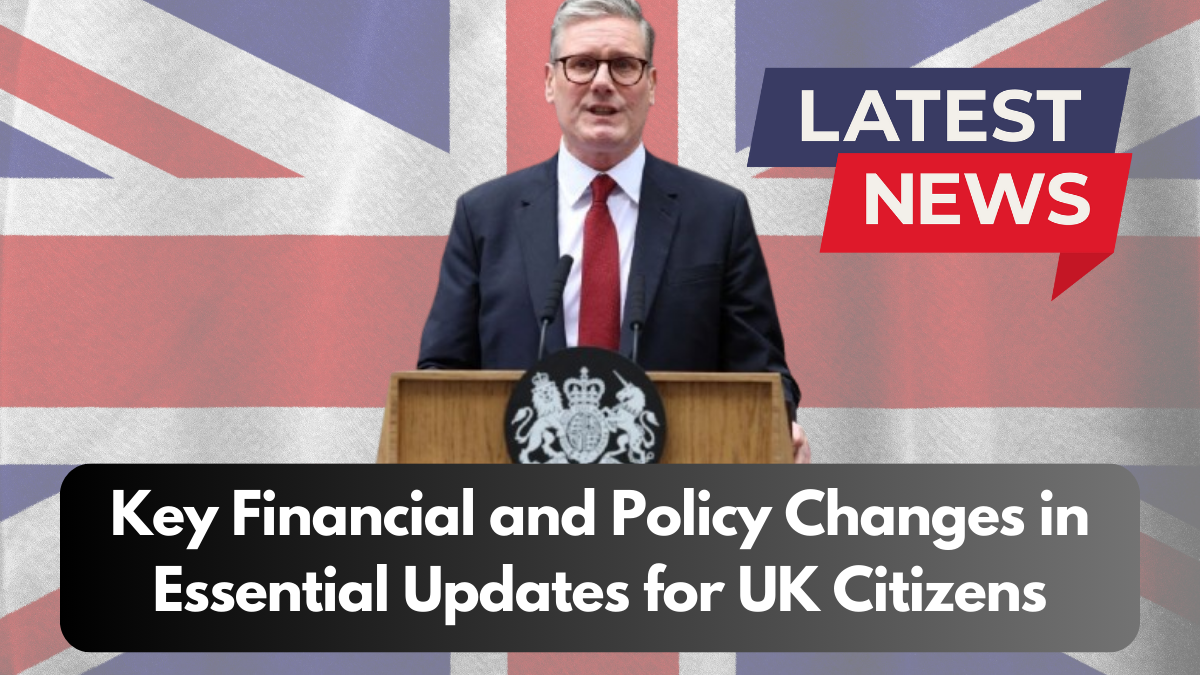In November 2024, numerous financial and policy changes in the UK are set to impact households and businesses alike. These adjustments cover increased energy costs, new mobile roaming guidelines, and updates in taxation and welfare programs. Here’s an in-depth look at these changes to help you stay prepared.

United Kingdom Financial and Policy Changes in 2024
Several new policies and price changes are rolling out this month, affecting household budgets across the UK. The energy price cap is rising by 10%, pushing the average annual bill to £1,717. Additionally, Royal Mail will hike the cost of first-class stamps by 22%, and new rules for mobile roaming charges will take effect, benefiting travellers. These adjustments aim to address rising costs but will require households to manage their finances accordingly.
Financial Updates and Department of Work and Pensions (DWP) Changes This Month
Increase in the Ofgem Energy Price Cap
Starting on November , Ofgem has raised the energy price cap by 10%, meaning households with typical usage can expect annual bills of around £1,717—an increase of £149 from the previous cap set in July. Households paying by standard credit will see the cap increase to £1,829, impacting both gas and electricity expenses.
How This Impacts You:
- Higher Monthly Expenses: Monthly bills will likely increase by approximately £12.50 for many homes.
- Budget Reassessments: Reviewing and adjusting budgets may be necessary to cover these rising energy costs.
- Energy-Saving Strategies: Switching to more energy-efficient appliances or adopting energy-saving practices can help reduce expenses.
- Explore Fixed-Rate Tariffs: Comparing fixed-rate energy deals might provide cost stability if you’re currently on a variable tariff.
- Government Support Programs: Check if you qualify for schemes like the Warm Home Discount or Winter Fuel Payment to offset higher costs.
Relaunch of the Warm Home Discount Scheme
The Warm Home Discount Scheme is reopening this November, offering a £150 discount on energy bills for eligible low-income households. This financial aid will help offset energy costs during the colder months.
Applying for the Warm Home Discount:
- Automatic Eligibility: Some households may receive this discount automatically, depending on their energy supplier’s participation.
- Verify Eligibility: Confirm with your supplier or on the government website to determine your qualification.
- Application Timing: Apply as early as possible if required to secure the discount.
- Discount Period: This rebate typically applies between November and March, helping to ease winter energy expenses.
- Additional Support: Consider combining this with other programs, like Cold Weather Payments, for greater financial relief.
New Mobile Roaming Regulations
From November 1, Ofcom’s updated regulations mandate that mobile providers inform customers of any roaming charges when traveling abroad, aimed at reducing unexpected costs.
What Travelers Need to Know:
- Automatic Alerts: Mobile providers will send notifications when you enter a new country, informing you of potential roaming fees.
- Transparent Fees: Providers must clearly display all roaming charges to avoid hidden costs.
- Free Information Access: Customers can access roaming cost details via SMS or online at no extra charge.
- Data Usage Monitoring: Regularly check your data usage to avoid additional charges while abroad.
- International Plans: Consider purchasing an international roaming plan if you frequently travel overseas.
Self-Assessment Registration Deadline
For the 2023-2024 tax year, individuals required to register for self-assessment, including the newly self-employed or those with additional income sources, must do so by November 5, 2024.
Steps for Self-Assessment Registration:
- Register Online: Use the HMRC website to register through your Government Gateway account.
- Required Information: Have your National Insurance number and other necessary personal details ready.
- Unique Taxpayer Reference (UTR): HMRC will issue a UTR after registration to facilitate tax submissions.
- Record-Keeping: Maintain a record of income and expenses for accurate reporting.
- Seek Professional Advice: Consider consulting a tax advisor if you need assistance with the process.
Royal Mail Stamp Price Increase
As of November 7, Royal Mail will raise the price of first-class stamps by 22%. Those who rely on postal services may wish to purchase stamps beforehand, as current stamps will remain valid even after the price increase.
Preparing for the Stamp Price Hike:
- Buy Stamps in Advance: Purchase stamps before November 7 to avoid paying more.
- Bulk Buying: If you frequently use postal services, consider stocking up on stamps.
- Digital Alternatives: Reduce postage expenses by opting for digital communication options.
- Check Parcel Rates: Review any updates to parcel and special delivery fees as well.
- Business Impact: Businesses should adjust their budgets to account for increased postal costs.
Financial Updates Summary Table
| Change | Effective Date | Details |
|---|---|---|
| Energy Price Cap Increase | November 1 | The annual cap rises to £1,717, up by £149, affecting household energy bills. |
| Warm Home Discount | November 2024 | Eligible households can receive a £150 rebate on their energy bills. |
| New Mobile Roaming Rules | November 1 | Providers are required to inform customers about roaming charges. |
| Self-Assessment Registration | November 5 | The deadline is to register for self-assessment for the 2023-2024 tax year. |
| Stamp Price Hike | November 7 | First-class stamps increased by 22%. |
| Bank Fraud Refunds | November 7 | Mandatory refunds of up to £85,000 for authorized payment fraud victims. |
| Inflation Data Release | November 16 | ONS will release the latest inflation data, impacting the cost of living. |
| Labour’s First Budget | November 30 | Budget announcement covering tax, spending, and welfare adjustments. |
| Paper Tax Submission | November 31 | The last date to submit paper tax returns for the 2023-2024 tax year is as follows: |
Introduction of New Bank Fraud Refund Rules
Since November 7, banks have been required to provide refunds of up to £85,000 for victims of authorized push payment (APP) fraud, an initiative led by the Payment Systems Regulator (PSR) to better support affected consumers.
Implications for Bank Customers:
- Automatic Refunds: Victims of APP fraud will automatically qualify for refunds.
- Compensation Limit: The refund cap is set at £85,000, covering the majority of fraud cases.
- Enhanced Security: Banks are expected to strengthen fraud detection and prevention efforts.
- Customer Vigilance: Stay alert to avoid falling victim to fraud.
- Prompt Reporting: Report any suspicious activity to your bank immediately for quicker assistance.
Frequently Asked Questions
1. What is the new Ofgem energy price cap?
As of November 1, 2024, Ofgem has increased the energy price cap by 10%, setting the average annual household bill at approximately £1,717.
2. Who qualifies for the Warm Home Discount Scheme?
Typically, households receiving Pension Credit or on low income are eligible. Participation from your energy supplier may make you automatically eligible.
3. How will the new mobile roaming rules impact travellers?
Mobile providers are now required to inform customers of roaming charges when entering a new country, helping travellers manage costs.
4. What do the new bank fraud refund rules mean for consumers?
As of November 7, banks must provide refunds for APP fraud, capped at £85,000, ensuring victims can reclaim losses more easily.
5. What are the deadlines for self-assessment registration and paper submission?
For those new to self-assessment, the registration deadline is November 5, 2024, with the paper submission deadline set for November 31, 2024.
Click here to know more.

Uday, with over 10 years experience in news and content writing, has been a key member of Sinaltrainal. Editorial team consists of professional content writers and editors who manage article content on Sinaltrainal.